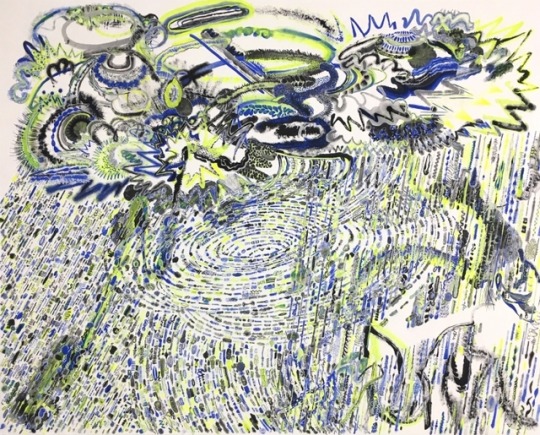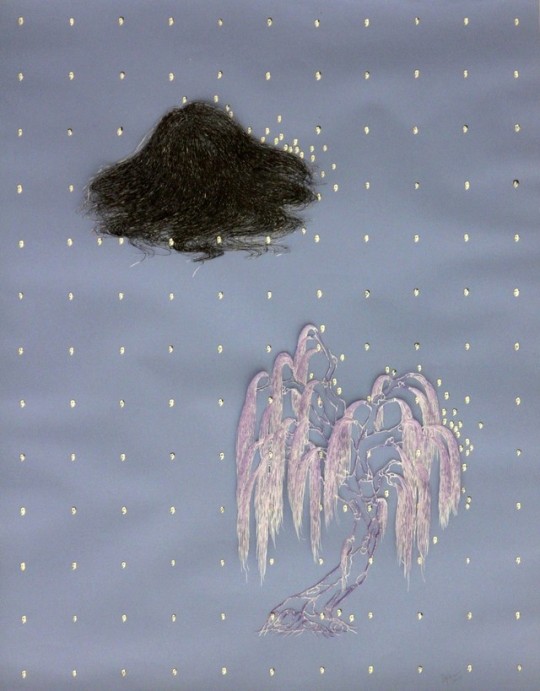#wu jian'an
Text
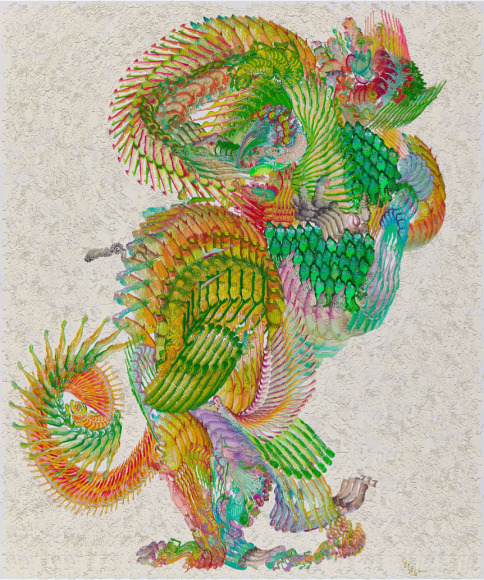
Jian'an - Hero conquering the Lion - 2020
source: pazzesco
1 note
·
View note
Note
Do we know why Cen Hun was despised? Do you think he deserves his negative reputation?
There's very little recorded. I think Sima Guang collected it all pretty well.
ZZTJ 80 discusses the execution of one Zhang Song.
Sun Hao was suspicious of anyone who seemed to be better than him. One such target of his suspicions was the Palace Attendant and Prefect of the Palace Secretariat, Zhang Shang. This Zhang Shang was the grandson of Zhang Hong. He was skilled at rhetoric and debate, and his petitions always resulted in discussions, so Sun Hao gradually began to hate him.
At one point, Sun Hao asked Zhang Shang, "In drinking wine, whom do I take after?"
Zhang Shang replied, "Your Majesty has 'the capacity of a hundred goblets'."
Sun Hao said, "You know very well that Confucius was not a king, and yet you compare me to him." He became suddenly angry, and ordered Zhang Shang to be arrested.
More than a hundred people, from the nobles and chief officials on down, came to the palace and kowtowed before Sun Hao, asking that he forgive Zhang Shang's offense. So Sun Hao at first spared Zhang Shang from death and merely exiled Zhang Shang to Jian'an commandary to build ships, but he soon had Zhang Shang killed anyway.
Sima Guang and Hu Sanxing elaborate in the commentary, in which they try to resolve certain contradictory accounts. This is where Cen Hun is relevant:
(Zhang Hong served under Sun Ce and Sun Quan, as seen in the part of Zizhi Tongjian dealing with the reign of Emperor Xian of Han.
The 孔叢子 has this story: "Lord Pingyuan of Zhao was drinking heavily together with Confucius, and he urged strong wine on him. Lord Pingyuan said to Confucius, 'It has been said that Emperor Yao could drink a thousand 鍾 of wine. You yourself can drink a hundred goblets, and from what your disciple Zilu claims, he can drink only ten vessels himself. Since all the worthies and sages of old were skilled drinkers, Master, what is your excuse?" A 觚 “goblet” is a kind of wine vessel, which can hold two 升 of wine.
Sima Guang's commentary in the Textual Analysis states, "The Annals of the Thirty Kingdoms states, 'Cen Hun and the other officials smeared their heads with mud and begged that they might suffer death in place of Zhang Shang. So Zhang Shang was able to avoid the death sentence, and was instead exiled to Guangzhou.' But I follow the account of the Biography of Zhang Shang in the Records of the Three Kingdoms (at the end of the Biography of Zhang Hong), with some additions from Master Huan's Records of Wu." As for what I (Hu Sanxing) believe, it was Zhang Shang's skill in dealing with people that allowed him to attain a position so close to Sun Hao, but it was that same skill which also brought on Sun Hao's rage against him. The people who pleaded for his life must have been Cen Hun's followers. The Annals of the Thirty Kingdoms must have been correct about this as well.)
If Sima Guang and Hu Sanxing are correct about Cen Hun and his adherents trying to save Zhang Shang, then he had at least some redeeming qualities. Wu's secondary chancellor Wan Yu was a very similar figure.
ZZTJ 81 provides the story of Cen Hun's death as the Jin armies drew close to the capital. This follows an account by Gan Bao who I don't generally trust, but the SGZ account doesn't really provide any details and Gan Bao's version (unlike his various supernatural tales) is not difficult to believe.
Sun Hao had a favored minister, Cen Hun, who was deviant and sinister, fawning and flattering. He held a position as high as the Nine Ministers, and he delighted in engaging in all sorts of plans and projects, so he was a great scourge and brought suffering to many.
When the Jin soldiers were about to arrive at Jianye, several hundred of Sun Hao's palace servants kowtowed before him and said, "The northern army is close at hand today, yet the soldiers will not lift their blades to fight. Does Your Majesty not know why this is?"
Sun Hao asked them, "What is the reason?"
They replied, "It is all just because of Cen Hun."
Sun Hao merely told them, "If it is as you say, then I shall have my slave apologize to the people!"
The crowd replied, "Indeed!"
And they all rose up to go arrest Cen Hun. Sun Hao kept sending men to pursue the crowd and stop them, but by then the crowd had already butchered Cen Hun.
Credit belongs to @fuyonggu for translating this some time ago. That's someone who really doesn't get enough appreciation.
12 notes
·
View notes
Text
Account of the Di (WS101)
[I.e. the kingdom of Chouchi. This post covers down to the ascension of Yang Baozong in 429]
The Di are a separate kind of the Western Yi, titled the Baima. At the juncture of the Three Eras, perhaps Bai was a lord or chief, but in that period there was a single court audience. For that reason the Poetry claims:
Since those Di and Qiang, do not dare not to come to the King.
From Qin, Han and onwards, for generation they lived in Qi, Long and southwards, and Hanchuan and westwards, and established themselves as prominent leaders.
In the middle of Han's Jian'an [196 – 220] there was Yang Teng, he was a great leader of the section's family groups. Teng was brave, strong and with many plans and schemes. He was the first to move to Chouchi. Chouchi has an area of a hundred [bai] qing, because of that he used it as a title. [All] four sides are steep and sheer, and are 7 li tall. The road coils like goat intestines for thirty-six rotations. On its top is the source of the Feng river. They cook the earth to achieve salt.
After Teng there was someone named Qianwan. Wei designated him as King of the Baiqing Di. Qianwan's grandson was named Feilong. He gradually grew strong and flourishing, Emperor Wu of Jin made use of him as General who Pacifies the West.
He had no sons, and reared his sister's son Linghu Maosou as his son. Middle of Emperor Hui's Yuankang era [291 – 299], Maosou titled himself General who Supports the State and Worthy King of the Right, the crowd of Di pushed him forward as ruler. Many of the gentlemen Within the Passes who drifted and moved about relied on him. Emperor Min used him as General of Agile Cavalry and Worthy King of Left.
Maosou died, and his son Nandi controlled the position. He and his younger brother Jiantou divided the entourage. Nandi titled himself Worthy King of the Left and stationed at Xiabian. Jiantou titled himself Worthy King of the Right, and stationed at Hechi.
Nandi died, his son Yi was installed. He titled himself Envoy Holding the Tally, Dragon Prancing General, Worthy King of the Left, and Duke of Duke of Xiabian. He used Jiantou's son Pan as Envoy Holding the Tally, General of the Best of the Army, Worthy King of the Right, and Duke of Hechi. He was subject to Jin, and Jin used Yi as General who Conquers the South.
3rd Year [of Xiankang, 337 AD, per Songshu], Yi's senior kinsman Chu assaulted and killed Yi, and also gained his multitudes. He installed himself as Duke of Chouchi and was subject to Shi Hu. Later he claimed to be vassal to Jin. 10th Year of Yonghe [354 AD], changed Chu to be Duke of Tianshui.
11th Year [355 AD], Yi's younger brother Songnu sent his aunt's son Liang Sanwang to take the opportunity of attending to straight away with blade in hand kill Chu. Chu's son Guo led left and right to excute Sanwang and Songnu, and then installed himself as Duke of Chouchi. Huan Wen petitioned for Guo to be Inspector of Qin province, and for Guo's son An to be Grand Warden of Wudu.
12th Year [356 AD], Guo's junior uncle's son Jun killed Guo and installed himself. Guo's son An betrayed Fu Sheng, killed Jun, and then declared himself a vassal to Jin.
An died, his son Shi installed himself as Duke of Chouchi. Jin's 3rd Year of Taihe [368 AD], used Shi as Inspector of Qin province, and his younger brother Tong as Grand Warden of Wudu.
Shi died. Tong deposed Shi's son Zuan and installed himself. Tong was also named De. Zuan assembled a faction, assaulted and killed Tong, and installed himself as Duke of Chouchi. He dispatched envoys to go to Emperor Jianwen, who used Zuan as Inspector of Qin province. Jin's 1st Year of Xian'an [371 Ad], Fu Jian dispatched Yang An to invade Zuan. He overcame him, and moved his people to Within the Passes, and emptied the land of Baiqing.
At the death of Songnu, his two sons Fonu and Fogou escaped and ran to Fu Jian. Jian used [a daughter] as wife to Fonu's son Ding, and designated him as Master of Writing and [General who] Leads the Army. At the defeat of Fu Jian, Guanyou was disturbed and chaotic. Ding exhausted his strength for Jian. When Jian died, he led the multitudes to run to Longyou. He moved to govern Licheng, which is 120 li from Chouchi, and set up granaries and stores at Baiqing. He summoned the barbarians and the Xia, and obtained more than a thousand families. He declared himself Dragon Prancing General and Duke of Chouchi, and declared to be vassal to Jin. Xiaowu promptly used what he had titled himself to make use of him, and later used him as Inspector of Qin province. 4th Year of Dengguo [389 AD], he thereupon had the land of Qin province, and titled himself as King of Longxi. He was later killed by Qifu Qiangui. He had no sons.
Fogou's son Sheng first was overseeing the state, and defended Chouchi. He then controlled affairs, titled himself General who Conquers the West, Inspector of Qin province, and Duke of Chouchi, and conferred posthumous title on Ding as Martial [wu] King. He divided the various Di and Qiang to make twenty sections with Army-Protectors. Each he made a garrison posts, and he did not set up commanderies and counties. Thereupon he had the land of Hanzhong, but continued to declare to be vassal to Jin. Beginning of Tianxing [398 – 404], he dispatched envoys to court [i.e. the Wei court] with tribute. A decree used Sheng as Great General who Conquers the South and King of Chouchi. He was isolated and blocked off by Yao Xing, and did not mange to communicate annually with tribute and envoys. Sheng used his older brother's son Fu as General who Pacifies the South and Inspector of Liang# province, to defend Hanzhong. Middle of Liu Yu's Yongchu [420 – 422], ennobled Sheng as King of Wudu. Sheng died, his private posthumous title was Kind and Civil [huiwen] King. His son Xuan controlled the position.
Xuan, courtesy name Huangmei, was titled Great General who Conquers the West, Opening Office with Ceremony Similar to the Three Ministers, Inspector of Qin province, and King of Wudu. Though he was a declared vassal to Liu Yilong, he continued to defer to the symbol of Jin's Yongxi era. Later he started to use Yilong's Yuanjia calendar.
Earlier, Sheng spoke to Xuan, saying:
I am aged and already old, and will end as a subject of Jin. For you it is good to serve the Song emperor.
For that reason Xuan deferred to him.
Xuan was good at entertaining scholars, and was cherished by migrants and long-time [inhabitants]. 4th Year of Shiguang [427 AD], Shizu dispatched the Great Swan-geese Arranger, Gongsun Gui, to designate Xuan as Great General who Conquers the South, Chief Controller, Inspector of Liang# province, and King of Nanqin. Xuan sent up a petition to request to be aligned with inner vassals. Allowed it. Xuan died, his private posthumous title was Filial and Luminous [xiaozhao] King. His son Baozong controlled the position.
3 notes
·
View notes
Photo
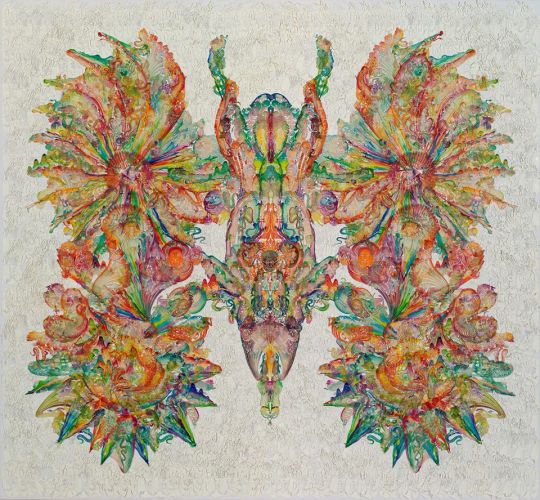
Giant Butterfly No.3 大蝴蝶之三 2017 | artwork by Wu Jian'an
11 notes
·
View notes
Photo
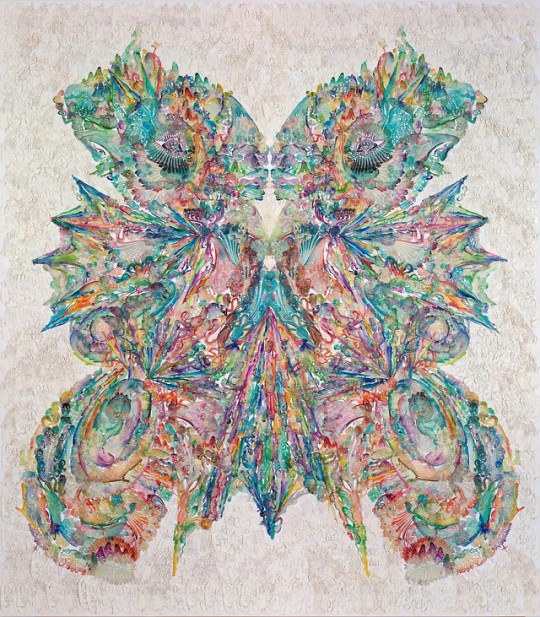
Wu Jian'an (Chinese, b. 1980) - Giant Butterfly No.1 大蝴蝶之一, Hand dyed and waxed paper-cut, cotton thread, paper 手工着色和浸蜡镂空剪纸, 棉线, 纸, 223.0 × 196.0 cm (2017)
294 notes
·
View notes
Photo
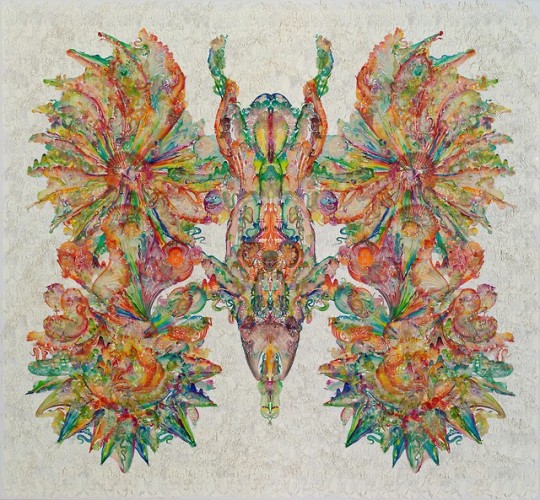
Wu Jian'an 邬建安 - Giant Butterfly No.3 (hand dyed and waxed paper-cut, cotton thread, paper, 2017)
93 notes
·
View notes
Photo
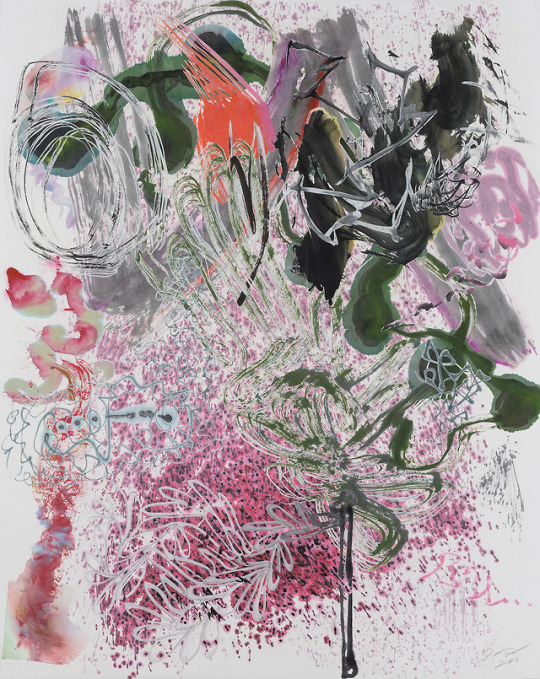
Wu Jian’an, 500 Brushstrokes #47 (2018). Ink, watercolour, paper cut and collage on Xuan paper. 120 x 160 cm.
Works by Wu Jian’an will be on view at Chambers Fine Art booth (W06) at ART021 in Shanghai from 9–12 November.
#wu jian'an#watercolour#works on paper#chambers fine art#chambers fine art gallery#art021#shanghai#ocula#ocula art
162 notes
·
View notes
Photo
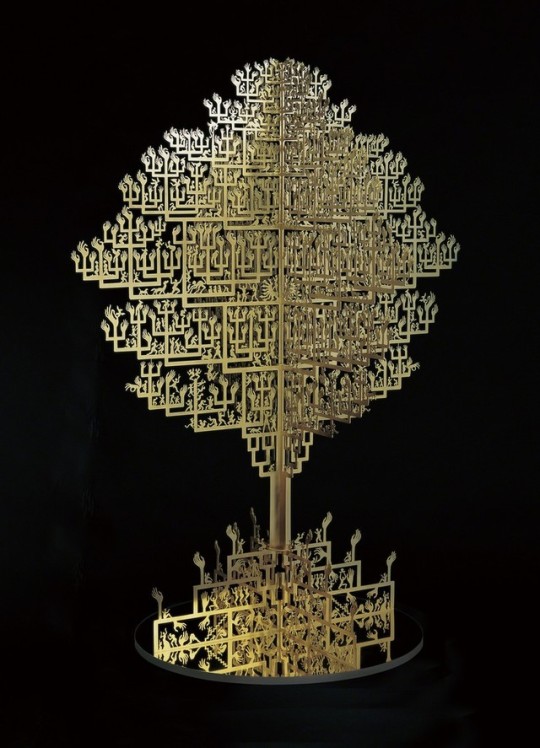
Wu Jian'an 邬建安, Golden Tree, 2006, Chambers Fine Art
2 notes
·
View notes
Text
临终诗 - last words
by 孔融 (Kong Rong, 153 - 208 CE)
言多令事败,器漏苦不密。
yán duō lìng shì bài, qì lòu kǔ bù mì
Speak overmuch and it leads to failure; a vessel which leaks suffers for its poor sealing.
河溃蚁孔端,山坏由猿穴。
hé kuì yǐ kǒng duān, shān huài yóu yuán xué
The bursting of a dam may be traced to the boring of ants, a mountain’s collapse to the cave-nests of apes.
涓涓江汉流,天窗通冥室。
juānjuān jiānghàn liú, tiānchuāng tōng míng shì
Slow streams join the Yangtze and Han River’s flow; a window to the sky is the opening into a dark chamber.
谗邪害公正,浮云翳白日。
chán xié hài gōngzhèng, fú yún yì bái rì
Vilifiers and the wicked inflict harm on the just and fair; clouds conceal the brilliant sun.
靡辞无忠诚,华繁竟不实。
mí cí wú zhōngchéng, huá fán jìng bù shí
Fine words are spoken without loyalty or sincerity, like marvelous blossoms that do not bear fruit.
人有两三心,安能合为一。
rén yǒu liǎng sān xīn, ān néng hé wéi yī
Man is often of two minds, their hearts split in three - how can they unite?
三人成市虎,浸渍解胶漆。
sān rén chéng shì hǔ, jìnzì jiě jiāo qī
Three gossipers can make rumored tigers in the city true; even glue dissolves when soaked long enough.
生存多所虑,长寝万事毕。
shēngcún duō suǒ lǜ, zhǎng qǐn wànshì bì
To live, to survive, there is much to consider and worry over, only in eternal sleep will all of these myriad troubles cease.
..............................................................................................
In Word of Honor, otherwise known as SHL 《山河令》, there have been many many MANY chinese poems quoted - kudos to the actors for delivering their lines so smoothly because these aren’t like your everyday speech at all - most of which I’ve never heard of!
Kong Rong’s 《临终诗》 ‘poem written before the end’ is the first of my Heard in SHL series, in which poems learnt through this drama are translated and explored. There will be no discussion of SHL here though - for that, please refer to What is the meaning of Tian Chuang 天窗 in which @tian-chuang discusses the interpretation of two key lines in this poem, also quoted and modified slightly in the drama, that are relevant to a certain organization within the story.
Some background on the poet and the circumstances under which he wrote his《临终诗》:
An official and writer who lived during the Eastern Han period, Kong Rong was the 20th generation descendant of Confucious.
// Sidetrack for Confucianism in the Han Dynasty & descendants of Kongzi (Confucius):
Through the interpretation of the scholar Dong Zhongshu, who lived during the Han dynasty from around 179 - 104 BCE, Confucianism became strongly linked to the cosmic framework of traditional Chinese thought (quote source). It was under the rule of Emperor Wu of Han, which spanned from 141 - 87 BC, that saw the rise of Confucianism as its principles were adopted into state philosophy and ethics in the empire.
However, even before that, in 195 BCE / 205BCE, when Emperor Gaozu of Han (Liu Bang) offered sacrifices at Kongzi’s temple in Qufu, Shandong, he granted the 8th direct descendant of Kongzi, Kong Teng the title of 奉祀君 or roughly Lord of Ceremonial Ritual. Thus beginning the practice of Emperors bestowing titles upon the descendants of Kongzi as a gesture of respect. Kong Teng later became Grand Tutor of the King of Changsha, and his great great grandson, Liu Ba, shared a similar role as the Grand Preceptor to Emperor Yuan of Han.
Sources are provided so you can explore yourself! Goodness knows how trapped in the link clicking loop I got, just reading up…
Sidetrack ends. //
But coming from a revered family is not everything. He was famous in his own right for his writing and poetry, and was honored as one of the Seven Masters of the Jian'an reign-period (196 - 220 CE).
Have you ever heard of that idiom 孔融让梨 / Kong Rong gave up the bigger pears? This is the same Kong Rong. It’s even ended up in the Three Character Classic, which had been used as an introductory text for children up until the 19th century (see paragraph 1, part 10).
According to Baidu, Kong Rong was also the sort of person that, even early in his career as an Assistant to the Minister over the Masses, would go in plainclothes to investigate corruption among officials and openly confront superiors who intended to sweep it all under the carpet. Years later, when there was a consensus among his peers in favour of the revival of amputation as punishment for crimes, he was able to convince them to give up the idea through an appeal to logic.
Those angered by his direct nature tended to think twice before offending him, because he was so highly respected.
Among them was Cao Cao - Grand Chancellor of the Eastern Han Dynasty who kept a tight hold over state affairs with Emperor Xian installed as figurehead. In public and in private letters, Kong Rong would speak his mind, pointing out mistakes and wrongdoing where he saw them with his sharp tongue. He praised good habits and deeds as well, and ensured that word of them spread far and wide. He believed positive things should be adopted and negative deeds avoided. For this, the scholars loved him even more dearly.
Of course, he criticized many of Cao Cao’s actions, opposed his policies and was openly loyal to the Han Court. He also submitted a memorial advocating a “recommendation to emulate the policies of old regarding the 1000 li of land surrounding the capital: enfeoffed nobility may not own land within this area” which would have strengthened the power of the imperial family.
Cao Cao’s wariness and anger towards him culminated in a strong desire to ensure his death. Chief of Military Advisors, Lu Cui, hence accused Kong Rong of various crimes such as "plotting a rebellion", "slandering the imperial court" and "disrespecting court protocol". He was found guilty and executed in public along with his family.
Translation of 《临终诗》:
Keeping the background of its writing in mind, to me, the poem reads as quiet but passionate, both a reflection and defiant statement. If you were wondering whether it was written during his imprisonment while awaiting sentencing, you would be right!
To be clear, I don’t believe he ever plotted against Cao Cao - at least there were no records of him doing so - so it was likely his words which landed him in this. He was a person who habitually reflected and corrected his own mistakes, and so the first three lines are an acknowledgement of his faults and a warning to others.
言多令事败 | speak overmuch and it leads to failure
器漏苦不密 | a vessel which leaks suffers for its poor sealing
He had been very vocal in his opposition of Cao Cao, and did not keep his dislike of the man secret. Kong Rong was a social butterfly and fond of calling for gatherings with friends. He spoke openly of his opinions there, but realizes now that that had been unwise.
河溃蚁孔端 | cause of a bursting dam may be traced to the boring of ants
山坏由猿穴 | a mountain’s collapse to the cave-nests of apes
And the accusations against him were really based on things he had said in the past. Easily overlooked and dismissed as small matters, but apparently just as easily used as punishable crimes if one had the mind to do so. Through these ‘small, innocuous matters’ he had made enemies, left weaknesses out in the open, and now they had come back to him in the most disastrous and final way possible.
The idiom of ‘ant nests burst dams’ or 堤溃蚁穴 originates from a line in Han Feizi’s twenty first chapter, 《喻老》 Illustrating Laozi’s Teachings, that goes roughly so - with units italicized (take with a pinch of salt please because I have no context):
千丈之堤,以蝼蚁之穴溃;百尺之室,以突隙之烟焚
qiānzhàng zhī dī, yǐ lóuyǐ zhī xué kuì; bǎi chǐ zhī shì, yǐ tū xì zhī yān fén
a dam of a thousand zhang may collapse from the boring of ants for their nests, a building of a hundred chi may be burned to ash from a spark in the narrowest crevice.
(There are apparently more political interpretations of this whole poem, by the way. I am choosing to ignore them as they are somewhat beyond me and I don’t want to mislead anyone.)
涓涓江汉流 | slow streams join the Yangtze and the Han River’s flow
天窗通冥室 | a window to the sky is the opening into a dark chamber
Continuing the analogy of small things combining for a far greater result - although… here the tone seems to have shifted from ‘what went wrong’ to ‘what should have been’.
Little streams 涓涓 flowing quietly, but gradually ever onwards, coming together to form a river like the Han River 汉江, which itself joins the Yangtze 长江 and rushing into the sea. It reminds me of idioms like 细水长流 in the sense of ‘do something small, but keep at it continuously and great things can be accomplished’. Had he been more discrete, more could have been accomplished for his wish of seeing the return of power to the legitimate ruling house of the Han Dynasty. Like sunlight shining into a dark room, chasing away the shadows.
As a aside, the reason 江汉 | jiāng hàn instantly made me interpret it as those two particular rivers is because from the Book of Poetry 诗经, there is this... Greater Odes of the Kingdom - Jiang Han 《大雅·江汉》.
And of course, the skylight, or as I called it, the window to the sky, was an opening on the roof of the house that allowed light and wind to enter. A number of sites - in Chinese only, sorry - (development of the window) (the romantic window ~) I found while trying to get a suitable photo mention that in the beginning, there were two types of windows, ‘窗 / 囱’ on the roof or ‘牎’ on the walls.
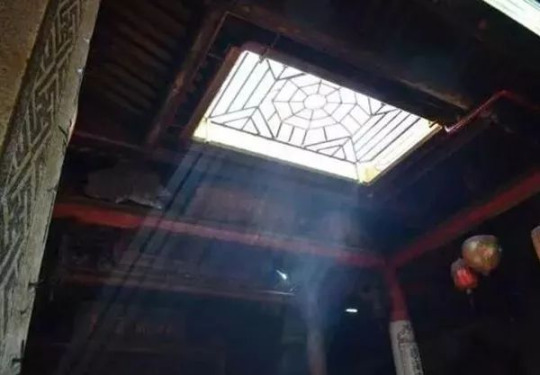
(Photo Source)
So the skylight 天窗 is the way through (for light) 通 into the dark chamber/room 冥室, would be how this sentence can be interpreted as shown in the photo above. The association of the word 冥 | míng with the Buddhist afterlife and underworld likely came after Kong Rong’s time, as Buddhism had just been brought to the Han people during the Yongping era (58 -75 CE) under Emperor Ming of Han less than 80 years before his birth, and was not widely practiced even up to the Three Kingdoms period (220 - 280 CE).
The next four sentences are about the external factors that have led to this situation. Here, there is anger and disdain for those with ill-intentions who seek to bring down the just, and also for gossips adding fuel to the fire. There is also a lament for the fact that it is the nature of man that they cannot stand united.
谗邪害公正 | vilifiers and the wicked inflict harm on the just and fair
浮云翳白日 | clouds conceal the brilliant sun
Slander 谗 from the cunning and evil 邪 harms 害 the just and fair / the proper enforcement of justice 公正. He’s certainly not the first to fall to this and shall not be the last, but that overwhelming indignity and helplessness of being imprisoned and convicted on trumped-up charges will never lessen no matter how many times you have seen this. Especially when it happens to yourself. The clouds blot out the sun, like the villains who cloud the vision of their lords.
靡辞无忠诚 | fine words are spoken without loyalty or sincerity
华繁竟不实 | like marvelous blossoms that do not bear fruit
How do they do that? With their deceptively flowery flattery, so easy on the ears, but none of it truly meant.
人有两三心 | man is often of two minds, their hearts split in three
安能合为一 | how can they unite?
And with such people around, you can never be sure of who they may be. One might be acquainted with a person, know them by what they show on the surface, but who can know for sure what they are thinking? Everyone has their own intentions and that makes it impossible to unite.
三人成市虎 | three gossipers can make rumored tigers in the city truth
浸渍解胶漆 | even glue dissolves when soaked long enough.
The line 三人成市虎 is a reference to an alleged speech by an official of the state of Wei in the Warring States period (475 BC – 221 BC), recorded in Annals of the Warring States. It has since become the proverb, 三人成虎 - three men make a tiger, which refers to the idea that if an unfounded premise repeated by many individuals, the premise will be erroneously accepted as the truth. Glue may be used to ensure things are stuck tightly together, but once they are soaked for long enough, they will inevitably loosen.
So these untruths may be unsupported, but repeated often and long enough, they can cause irreversible harm to even the strongest person.
生存多所虑 | to live, to survive, there is much to consider and worry over
长寝万事毕 | only in eternal sleep will all of these myriad troubles cease
This may sound like he has accepted his fate, but has he really? His rage, resentment, helplessness and exhaustion have reached their peak. ‘Living in a world like this? Might as well be dead’, he says.
And these are his last words.
#临终诗#孔融#heard in shl#poems#i wanted to just translate and briefly explain#but joke's on me i guess#i do so love doing this though#even if i cry on twitter a lot#there's like only ONE picture hahaahhaha#and a wall of text#sorry not sorry#i had fun xD#commentary
61 notes
·
View notes
Note
As a thought exercise, if there was an Assassin’s Creed set during the Three Kingdoms, who might it be interesting to assassinate? If I recall correctly, they often choose historical figures who died of illness or in the heat of battle, so if we went by that criteria there’d be quite a few possibilities, yes? Off the top of my head would be Lu Meng, Gan Ning, Cao Cao and Xiahou Dun, since they all died around the same time.
There are a lot of little pieces of the overall 3K era where you could have a lot of fun with a game of that style. The chaotic Sanping years provide plenty of opportunities, along with early Jian'an. Things probably slow down a bit during the second half of Cao Cao's career but pick up again around 219.
Personally, I'd be more interested in exploring the politics and drama of the "Regency" years. The factional conflicts in Wei and Wu provide the perfect backdrop for that style of narrative, and you can always throw Fei Yi's death in there for good measure.
Not that I would expect Ubisoft to do any of it in a good or interesting way, but there are a lot of stories in the time period that would be interesting to tell. I particularly love anything that looks at the political drama of the post-Wuzhang years, since I never get to see it.
4 notes
·
View notes
Text
Tongdian: Introduction to Provinces and Commanderies, the Three States
[From TD171. The maps are intended as illustrations of the text. Some of the provincial information presented looks questionable.]
The Wei clan possessed the Central Plains. They had 13 provinces: Sili司隸, Jing荊, Jinghe荊河, Yan兗, Qing青, Xu徐, Liang涼, Qin秦, Ji冀, You幽, Bing并, Yang揚, and Yong雍 [1].
They had 68 commanderies and states. From the east, Guangling廣陵[2], Shouchun壽春[3], Hefei合肥[4], Miankou沔口][5], Xiyang西陽[6] and Xiangyang襄陽[7] had the main troops readied against Wu. From the west, Longxi隴西[8], Nan'an南安[9], Qishan祁山[10], Hanyang漢陽[11], and Chencang陳倉[12] had the main troops readied against Shu.
[1]They divided Liang涼 province to set up Qin秦 province, managing Shanggui上邽, present Tianshui天水 commandery. Yang揚 was seated at Shouchun壽春, the present commandery. Xu徐 was seated at Pengcheng彭城, the present commandery. Jing荊 was seated at Xiangyang襄陽, the present commandery. Liang涼 was seated at Wuwei武威, the present commandery. The remainder all followed previous eras.

[2]Emperor Wen in the 6th Year of Huangchu [225 AD] campaigned in person, and favoured Guangling廣陵's old city. When he turned around the host, he kept behind Zhang Liao to station at Jiangdu江都. After the King of Qi's Jiaping [249 – 253] era, it belonged to Wu. Precisely the present commandery.
[3]Guanqiu Jian and Zhuge Dan both garrisoned it.
[4]Emperor Ming's 1st Year of Qinglong [233 AD], Man Chong built a new city 30 li to the north-west of Hefei合肥. The Wu army frequently attacked, but did not take it. Precisely the present Lujiang廬江 commandery. For that reason, Emperor Ming of Wei stated: “The Former Emperor to the east set up Hefei合肥, to the south defended Xiangyang, and to the west strengthened Qishan祁山. The thieves come and are always routed beneath the three cities, the land is surely striving against them.”
[5]15th Year of Jian'an [210 AD], Wen Pin was Grand Warden of Jianxia江夏, and garrisoned here. After that the Wu army frequently attacked, but did not take it. After Qinglong [233 – 237], it belonged to Wu. Precisely the current Hanyang漢陽 county.
[6]Middle of Huangchu [220 – 226], Man Chong ordered generals to defend it. Present Qi'an齊安 commandery.
[7]24th Year of Jian'an [219 AD], Xu Huang defended it. The Shu general Guan Yu attacked. He did not submit.
[8]The present commandery.
[9]Present Longxi隴西 commandery's Longxi隴西 county. The King of Qi's 5th Year of Jiaping [253 AD], the Shu general Jiang Wei came to invade. He attacked Longxi隴西 and Nan'an 南安, in both cases he did not overcome them.
[10]Emperor Ming's 2nd Year of Taihe [228 AD], the Shu general Zhuge Liang attacked Qishan祁山 city, but did not take it. 10 li east of present Tonggu同谷郡 commandery's Changdao長道 county.
[11]Emperor Ming's 2nd Year of Qianlong [234 AD], the Shu general Zhuge Liang came to invade. Dispatched troops prepare at this place. Precisely the present Tianshui天水 commandery.
[12]24th Year of Jian'an [219 AD], following Shu's generals routing Xiahou Miaocai in Hanzhong漢中, thereupon ordered Zhang He to defend Chencang陳倉. 2nd Year of Taihe [228 AD], Zhuge Liang, with several ten thousand people, attacked Chencang陳倉. General Hao Zhao, with a thousand people, defended for more than twenty days, and he did not take it. The old city located 30 li east of the present county. He attacked Mei郿, and again did not overcome. The old Mei郿 city 15 li north-east of the present county. Both are in the present Fufeng扶風 commandery and county.
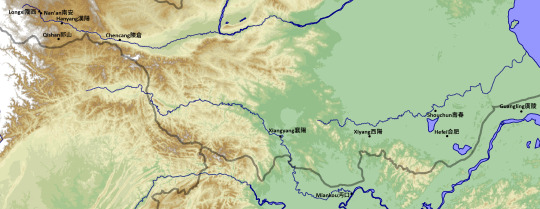
The rulers of Shu maintained order in Ba巴 and Shu蜀. They set up Yi益[1] and Liang 梁[2], 2 provinces, had 22 commanderies, and used Hanzhong漢中[3], Xingshi興勢[4], and Baidi白帝[5] together as the main garrisons.
[1]Seated at Chengdu成都, the present commandery.
[2]Seated at Hanzhong漢中, the present commandery.
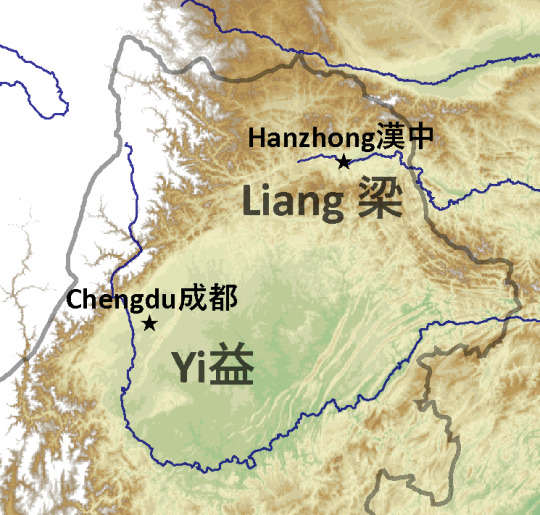
[3]End of Jian'an [196 – 220], after routing Wei's general Xiahou Miaocai, they thereupon had Hanchuan漢川, and used Wei Yan to garrison and defend. Later Jiang Wan and Jiang Wei continued each other in garrisoning at this place. Precisely the present commandery's territory.
[4]The Later Ruler's 7th Year of Yanxi [244 AD], General Wang Ping defended it. Wei's Great General Cao Shuang attacked, but did not overcome. Present Yangchuan洋川 commandery's Xingdao興道 county.
[5]The Former Ruler in the 1st Year of Zhangwu [221 AD] stationed there, and thereupon made it a main garrison. The Later Ruler's 15th Year of Jianxing [237 AD], Wu's general Quan Cong attacked, but did not overcome. Precisely the present Yun'an雲安 commandery.

The rulers of Wu to the north possessed the Jiang, and to the south everything until the sea. They set up Jiao交[1], Guang廣[2], Jing荊[3], Ying郢[4], and Yang揚[5], 5 provinces, had 43 commanderies, and used Jianping建平[6], Xiling西陵[7], Lexiang樂鄉[8], Nan commandery南郡[9], Baqiu巴丘[10], Xiakou夏口[11], Wuchang武昌[12], Huancheng皖城[13], Niuzhuqi牛渚圻[14], and Ruxuwu濡須塢[15] together as the main garrisons. They later obtained Miankou沔口[16], Zhucheng邾城[17], and Guangling廣陵[18].
From three states' tripod establishment, they in turn raided and invaded each other, and exchanged victories and losses. In the defense of the borders, what was one or the other's territory was not consistent. To slander success and bring life to failure, then one does not have the leisure to live. Now roughly summarized their long past stations and garrisons and the lands of their strategic points[19].
[1]Seated at Longbian龍編, present Annan安南 office.
[2]Sun Quan set it up, seated at Panyu番禺, present Nanhai南海 commandery.
[3]Seated at Nan commandery南郡, present Jiangling commandery江陵郡.
[4]Seated at Jiangxia江夏, precisely the present commandery.
[5]Seated at Jianye建業, present Danyang丹陽 commandery's Jiangning江寧 county.
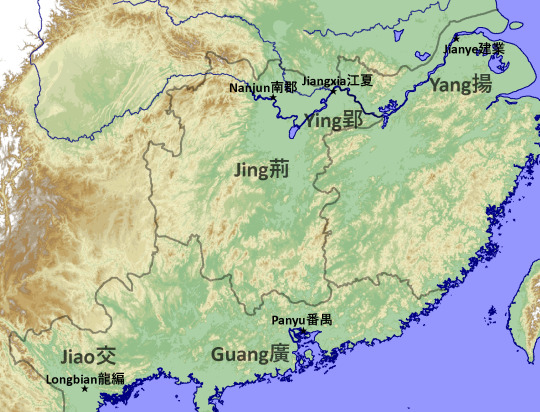
[6]From Sun Quan in the beginning of Huangwu [222 -229] routed the Former Ruler of Shu afterwards, they obtained it. Sun Hao's 4th Year of Tianji [280 AD], the Jin army followed the flow to come and invade. The defending general Wu Yan requested to increase the troops. Hao did not follow. Present Badong巴東 commandery.
[7]24th Year of Jian'an [219 AD], following the Shu general Guan Yu northern chastisement of the Wei general Yu Jin and others at Xiangyang襄陽, Lu Xun was made warden of Yidu宜都 and garrisoned this place. Beginning of Huangwu [222 -229], the Former Ruler of Shu came to invade. Xun greatly routed him. Later Bu Chan and Lu Kang both garrisoned here. Precisely the present Yiling夷陵 commandery.
[8]Sun Hao of Wu's 3rd Year of Jiancheng [271 AD], Lu Kang erected Lexiang樂鄉 City. Afterwards Zhu Ran repaired and completed it. Jin's Wang Jun attacked Lexiang, and captured the Controller of the Navy, Lu Jing. The General who Pacifies the West, Shi Hong, used the city to surrender. It is east of the present Jiangling江陵 commandery's Songzi松滋 county.
[9]From the end of Jian'an [196 – 220], after they overcame Guan Yu, the Shu general Mi Fang came to surrender, and they thereupon obtained it. Sun Hao's 1st Year of Fenghuang [272 AD], generals Zhang Xian and Ren Yan bother defended it. When the Jin army pacified Wu, the Marquis of Dangyang, Du Yuankai, proceeded to this place. Precisely the present Jiangling江陵 commandery.
[10]In 19th Year of Jian'an [214 AD] Lu Su, and in Sun Hao's 1st Year of Baoding [266 AD], Wan Yu, both garrisoned and defend it. Precisely the present Baling巴陵 commandery.
[11]13th Year of Jian'an [208 AD], Sun Quan campaigned against Huang Zu, and vanquished him, and afterwards then set up troops and garrison. Sun Hao's 1st Year of Tianji [277 AD], Sun Shen defended it. When Jin pacified Wu, General Hu Fen proceed to here. Precisely the present Jiangxia江夏 commandery.
[12]Sun Quan's 1st Year of Ganlu [265 AD], he walled Wuchang武昌. Lu Xun, Zhuge Ke, and Teng Mu garrisoned and defended it. When Jin pacified Wu, General Wang Rong proceed to here. Precisely the Jiangxia江夏 commandery's county.
[13]19th Year of Jian'an [214 AD], Sun Quan vanquished it. Sun Quan's 4th Year of Chiwu [241 AD], Zhuge Ke stationed here. Presently Tong'an同安 commandery. 皖 is pronounced huan患.
[14]End of Sun Hao's Tianji [277 – 280], He Zhi garrisoned and defended it. When Jin pacified Wu, the great general Wang Hun proceeded to here. Precisely the present Xuancheng宣城 commandery's Dangtu當塗 county's Caishi采石.
[15]17th Year of Jian'an [212 AD], constructed. Later Excellency Cao came again and again, he attacked and did not vanquish it. Located 180 li south-west of present Liyang歷陽 county.
[16]After Sun Quan's Jiahe [232 – 238], Lu Xun and Zhuge Jin stationed and defended it.
[17]4th Year of Chiwu [241 AD], Liu Xun with 30 000 troops regularly defended the border there. Present Qi'an齊安 commandery. East to west the boundary overlooks the Jiang江, it and Jianxia江夏 commandery's Wuchang武昌 face each other.
[18]Sun Liang's 2nd Year of Jianxing [253 AD], Commandant of Guards Feng Zhao walled Guangling廣陵.
[19]Their defending generals are likewise roughly summarized for those whose name is known. The remainder who are impossible to extensively bring up, they likewise copied these.
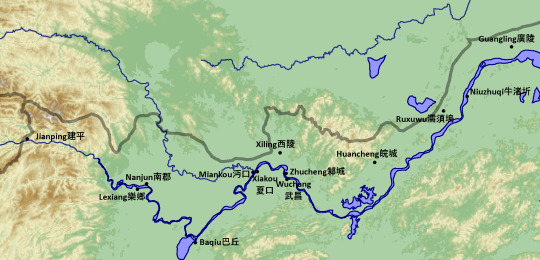
5 notes
·
View notes
Text
Administrative Geography of Yizhou, Lianzhou, and Ningzhou in ~280 AD (Book of Jin)
“Commandary” doesn’t even sound like a word anymore...
益州
YIZHOU
案《禹貢》及舜十二牧俱爲梁州之域,周合梁於雍,則又爲雍州之地。《春秋元命包》云:「參伐流爲益州,益之爲言阨也。」言其所在之地險阨也,亦曰疆壤益大,故以名焉。始秦惠王滅蜀,置郡,以張若爲蜀守。及始皇置三十六郡,蜀郡之名不改。漢初有漢中、巴、蜀。高祖六年,分蜀置廣漢,凡爲四郡。武帝開西南夷,更置犍爲、牂柯、越巂、益州四郡,凡八郡,遂置益州統焉,益州蓋始此也。及後漢,明帝以新附置永昌郡,安帝又以諸道置蜀、廣漢、犍爲三郡屬國都尉,及靈帝又以汶江、蠶陵、廣柔三縣立汶山郡。獻帝初平元年,劉璋分巴郡立永寧郡。建安六年,改永寧爲巴東,以巴郡爲巴西,又立涪陵郡。二十一年,劉備分巴郡立固陵郡。蜀章武元年又改固陵爲巴東郡,巴西郡爲巴郡,又分廣漢立梓潼郡,分犍爲立江陽郡,以蜀郡屬國爲漢嘉郡,以犍爲屬國爲朱提郡。劉禪建興二年,改益州郡爲建寧郡,廣漢屬國爲陰平郡,分建寧永昌立雲南郡,分建寧牂柯立興古郡,分廣漢立東廣漢郡。魏景元中,蜀平,省東廣漢郡。及武帝泰始二年,分益州置梁州,以漢中屬焉。七年,又分益州置寧州。益州統郡八,縣四十四,戶十四萬九千三百。
In distant antiquity, the area that would later be known as Yizhou was included within the territory of Lianzhou, as defined by both the description of the realm in the Tribute of Yu and in the territories that the ancient Emperor Shun assigned to his Twelve Governors. During the Zhou dynasty, since Lianzhou was combined with Yongzhou, the future Yizhou region was also included in Yongzhou.
Regarding the name Yizhou, the text 春秋元命包 states, "The Can and Fa stars wander through Yizhou, so named for its narrowness." That is to say, it was named because of the land's rough and narrow terrain. Or it is also said that it is called Yi (益 "more") because of its very expansive land and soil.
When King Huiwen of Qin conquered the state of Shu (in 316 BC), he organized the entire former state into Shu commandary, with Zhang Ruo as its Administrator. When the First Emperor of Qin organized the whole realm into thirty-six commandaries (in 221 BC), Shu commandary's name was left unchanged.
At the beginning of the Han dynasty (~206 BC), the region was the three commandaries of Hanzhong, Ba, and Shu. In the sixth year of Emperor Gaozu of Han's (Liu Bang's) reign (201 BC), he split off part of Shu commandary to form Guanghan commandary, thus there were four commandaries in total. After Emperor Wu expanded into the southwest at the expense of the local tribes (in 135 BC), he organized the new territory into the four additional commandaries of Jianwei, Zangke, Yuegui, and Yizhou, making eight in total. He also organized these eight commandaries into the single province of Yizhou; this must have been the first appearance of Yizhou.
During Later Han, Emperor Ming organized newly submissive territory into Yongchang commandary (in 58 AD), Emperor An established Commandants of Vassal States attached to the commandaries of Shu, Guanghan, and Jianwei, and Emperor Ling organized the three counties of Wenjiang, Canling, and Guangrou into a new Wenshan commandary. In Emperor Xian's first year of Chuping [should be Xingping, 194], Liu Zhang split off part of Ba commandary and formed Yongning commandary. In his sixth year of Jian'an (201), Yongning commandary was renamed to Ba commandary while the original commandary was renamed to Baxi; Fuling commandary was also established. In the twenty-first year of Jian'an (216), Liu Bei split off part of Ba commandary to form Guling commandary.
In Shu-Han's first year of Zhangwu (221), Guling commandary was renamed to Badong commandary, while Baxi's name was restored to Ba commandary. They also split off part of Guanghan commandary to form Zitong commandary, split off part of Jianwei commandary to form Jiangyang commandary, reorganized the Vassal State attached to Shu commandary as Hanjia commandary, and reorganized the Vassal State attached to Jianwei commandary as Zhuti commandary. In Liu Shan's second year of Jianxing (224), he renamed Yizhou commandary to Jianning commandary, reorganized the Vassal State attached to Guanghan commandary as Yinping commandary, split off part of Jianning and Yongchang commandaries to form Yunnan commandary, split off parts of Jianning and Zangke commandaries to form Xinggu commandary, and split off part of Guanghan commandary to form Eastern Guanghan commandary. During Cao-Wei's Jingyuan reign era (263-264), they conquered Shu-Han, and they abolished Eastern Guanghan commandary.
In Emperor Wu of Jin's second year of Taishi (266), he split off [the northern] part of Yizhou to form the new province of Lianzhou, with Hanzhong commandary as part of it. In the seventh year of Taishi (271), he also split off [the southern] part of Yizhou to form the new province of Ningzhou.
What follows is the geography of Yizhou as it existed around the first year of Taikang (280). It administered eight commandaries and forty-four counties, and had a population of 149,300 households.
蜀郡〈秦置。統縣六,戶五萬。〉
Shu Commandary
(The state of Qin established this commandary. At this time, it administered six counties and had a population of 50,000 households.)
成都 廣都 繁 江原 臨邛 郫
Chengdu
Guangdu
Fan
Jiangyuan
Linqiong
Pi
犍爲郡〈漢置。統縣五,戶一萬。〉
Jianwei Commandary
(The Han dynasty established this commandary. At this time, it administered five counties and had a population of 10,000 households.)
武陽 南安 僰道 資中 牛鞞
Wuyang
Nan'an
Bodao
Zizhong
Niubing
汶山郡〈漢置。統縣八,戶一萬六千。〉
Wenshan Commandary
(The Han dynasty established this commandary. At this time, it administered eight counties and had a population of 16,000 households.)
汶山 升遷 都安 廣陽 興樂 平康 蠶陵 廣柔
Wenshan
Shengqian
Du'an
Guangyang
Xingle
Pingkang
Canling
Guangrou
漢嘉郡〈蜀置。統縣四,戶一萬三千。〉
Hanjia Commandary
(Shu-Han formed this commandary. At this time, it administered four counties and had a population of 13,000 households.)
漢嘉 徙陽 嚴道 旄牛
Hanjia
Xiyang
Yandao
Maoniu
江陽郡〈蜀置。統縣三,戶三千一百。〉
Jiangyang Commandary
(Shu-Han established this commandary. At this time, it administered three counties and had a population of 3,100 households.)
江陽 符 漢安
Jiangyang
Fu
Han'an
朱提郡〈蜀置。統縣五,戶二千六百。〉
Zhuti Commandary
(Shu-Han established this commandary. At this time, it administered five counties and had a population of 2,600 households.)
朱提 南廣 漢陽 南秦 堂狼
Zhuti
Nanguang
Hanyang
Nanqin
Tanglang
越巂郡〈漢置。統縣五,戶五萬三千四百。〉
Yuegui Commandary
(The Han dynasty established this commandary. At this time, it administered five counties and had a population of 53,400 households.)
會無 邛都 卑水 定苲 臺登
Huiwu
Qiongdu
Beishui
Dingzha
Taideng
牂柯郡〈漢置。統縣八,戶一千二百。〉
Zangke Commandary
(The Han dynasty established this commandary. At this time, it administered eight counties and had a population of 1,200 households.)
萬壽 且蘭 談指 夜郎 毋歛 幷渠 鄨 平夷
Wanshou
Qielan
Tanzhi
Yelang
Wuhan
Bingqu
Bi
Pingyi
惠帝之後,李特僭號於蜀,稱漢,益州郡縣皆沒于特。李雄又分漢嘉、蜀二郡立沈黎、漢原二郡。是時益州郡縣雖沒李氏,江左並遙置之。桓溫滅蜀,其地復爲晉有,省漢原、沈黎而立南陰平、晉原、寧蜀、始寧四郡焉。咸安二年,益州復沒於苻氏。太元八年,復爲晉有。隆安二年,又立晉熙、遂寧、晉寧三郡云。
After the reign of Emperor Hui of Jin, Li Te declared himself King in Shu and called his state Han (in 303), and Yizhou and its counties and commandaries were lost to Jin. During his reign, Li Xiong split off parts of Hanjia and Shu commandaries to form the new commandaries of Chenli and Hanyuan. And even though Jin no longer actually controlled Yizhou, they still appointed officials for Yizhou and its counties and commandaries in absentia from their new base in the Southland. After Huan Wen conquered Shu (in 347) and Jin recovered the province, Chenli and Hanyuan commandaries were abolished, while four new commandaries were established: Southern Yinping, Jinyuan, Ningshu, and Shining. In the second year of Xian'an (373), Yizhou was once again lost to Jin, this time coming under the control of the Fu clan of Former Qin. But in the eighth year of Taiyuan (383), Jin recovered the province again. In the second year of Long'an (398), Jin also established three new commandaries: Jinxi, Suining, and Jinning.
梁州
LIANZHOU
[This should be spelled Liangzhou, but I am distinguishing it from the northwestern province 涼州 Liangzhou.]
案《禹貢》華陽黑水之地,舜置十二牧,則其一也。梁者,言西方金剛之氣強梁,故因名焉。《周禮》職方氏以梁并雍。漢不立州名,以其地爲益州。及獻帝初平六年,以臨江縣屬永寧郡。建安六年,劉璋改永寧爲巴東郡,分巴郡墊江置巴西郡。劉備據蜀,又分廣漢之葭萌、涪城、梓潼、白水四縣,改葭萌曰漢壽,又立漢德縣,以爲梓潼郡;割巴郡之宕渠、宣漢、漢昌三縣置宕渠郡,尋省,以縣並屬巴西郡。泰始三年,分益州,立梁州於漢中,改漢壽爲晉壽,又分廣漢置新都郡。梁州統郡八,縣四十四,戶七萬六千三百。
In distant antiquity, the Tribute of Yu in the Book of Documents describes Lianzhou as being the region "south of Mount Hua and along the Black River". And when the ancient Emperor Shun appointed his Twelve Governors, one of them was for Lianzhou.
Regarding the name Lianzhou, it was said that the minerals of the west had a strong and 梁 "firm" spirit, thus the name.
According to the Rites of Zhou, the Lianzhou region was governed by the officials of Yongzhou.
The Han dynasty never organized this region into its own province of Lianzhou; it remained part of Yizhou privince. In Emperor Xian's sixth year of Chuping [should be the first year, 190], Linjiang county was placed under Yongning commandary. In the sixth year of Jian'an (201), Liu Zhang renamed Yongning commandary to Badong commandary and split off parts of Ba and Dianjiang commandaries to form Baxi commandary. After Liu Bei occupied the Shu region (in 215), he split off the counties of Jiameng, Fucheng, Zitong, and Baishui from Guanghan commandary, formed a new Hande county, and organized all of them into the new Zitong commandary; he also renamed Jiameng to Hanshou county. He also split off the counties of Dangqu, Xuanhan, and Hanchang from Shu commandary and organized them into the new Dangqu commandary, and although he soon abolished this commandary, these counties were now placed under Baxi commandary.
In Jin's third year of Taishi (267), they split off [the northern] part of Yizhou to form the new province of Lianzhou at Hanzhong. They named Hanshou to Jinshou, and they split off part of Guanghan commandary to form Xindu commandary.
What follows is the geography of Lianzhou as it existed around the first year of Taikang (280). It administered eight commandaries and forty-four counties, and had a population of 76,300 households.
漢中郡〈秦置。統縣八,戶一萬五千。〉
Hanzhong Commandary
(The Qin dynasty established this commandary. At this time, it administered eight counties and had a population of 15,000 households.)
南鄭 蒲池 褒中 沔陽 成固 西鄉 黃金 興道
Nanzheng
Puchi
Baozhong
Mianyang
Chenggu
Xixiang
Huangjin
Xingdao
梓潼郡〈蜀置。統縣八,戶一萬二百。〉
Zitong Commandary
(Shu-Han created this commandary. At this time, it administered eight counties and had a population of 12,000 households.)
梓潼 涪城 武連 黃安 漢德 晉壽 劍閣 白水
Zitong
Fucheng
Wulian
Huang'an
Hande
Jinshou
Jiange
Baishui
廣漢郡〈漢置。統縣三,戶五千一百。〉
Guanghan Commandary
(The Han dynasty established this commandary. At this time, it administered three counties and had a population of 5,100 households.)
廣漢 德陽 五城
Guanghan
Deyang
Wucheng
新都郡〈泰始二年置。統縣四,戶二萬四千五百。〉
Xindu Commandary
(Jin created this commandary in the second year of Taishi (266). At this time, it administered four counties and had a population of 24,500 households.)
雒 什方 緜竹 新都
Luo
Shenfang
Mianzhu
Xindu
涪陵郡〈蜀置。統縣五,戶四千二百。〉
Fuling Commandary
(Shu-Han established this commandary. At this time, it administered five counties and had a population of 4,200 households.)
漢復 涪陵 漢平 漢葭 萬寧
Hanfu
Fuling
Hanping
Hanjia
Wanning
巴郡〈秦置。統縣四,戶三千三百。〉
Ba Commandary
(The Qin dynasty established this commandary. At this time, it administered four counties and had a population of 3,300 households.)
江州 墊江 臨江 枳
Jiangzhou
Dianjiang
Linjiang
Zhi
巴西郡〈蜀置。統縣九,戶一萬二千。〉
Baxi Commandary
(Shu-Han established this commandary. At this time, it administered nine counties and had a population of 12,000 households.)
閬中 西充國 蒼溪 岐愜 南充國 漢昌 宕渠 安漢 平州
Langzhou
Western Chongguo
Cangxi
Qiqie
Southern Chongguo
Hanchang
Dangqu
Anhan
Pingzhou
巴東郡〈漢置。統縣三,戶六千五百。〉
Badong Commandary
(The Han dynasty established this commandary. At this time, it administered three counties and had a population of 6,500 households.)
魚復 朐䏰 南浦
Yufu
Qurun
Nanpu
太康六年九月,罷新都郡并廣漢郡。惠帝復分巴西置宕渠郡,統宕渠、漢昌、宣漢三縣,并以新城、魏興、上庸合四郡以屬梁州。尋而梁州郡縣沒于李特,永嘉中又分屬楊茂搜,其晉人流寓於梁益者,仍於二州立南北二陰平郡。及桓溫平蜀之後,以巴漢流人立晉昌郡,領長樂、安晉、延壽、安樂、宣漢、寧都、新興、吉陽、東關、永安十縣;又置益昌、晉興二縣,屬巴西郡;於德陽界東南置遂寧郡;又於晉壽置劍閣縣,屬梁州。後孝武分梓潼北界立晉壽郡,統晉壽、白水、邵歡、興安四縣;梓潼郡徙居梓潼,罷劍閣縣;又別置南漢中郡,分巴西、梓潼爲金山郡。及安帝時,又立新巴、汶陽二郡,又有北新巴、華陽、南陰平、北陰平四郡,其後又立巴渠、懷安、宋熙、白水、上洛、北上洛、南宕渠、懷漢、新興、安康等十郡。
In the sixth year of Taikang (285), the ninth month, Jin abolished Xindu commandary and combined it into Guanghan commandary. Emperor Hui of Jin later split off the counties of Dangqu, Hanchang, and Xuanhan from Baxi commandary to form Dangqu commandary, and he merged that and the commandaries of Xincheng, Weixing, and Shangyong into Lianzhou. Lianzhou and its counties and commandaries were soon lost to Li Te as well (in ~303). During the Yongjia reign era (307-312), [the Chouchi ruler] Yang Maosou also controlled part of Lianzhou as well. Since many refugees of Jin people (ethnic Han) from Lianzhou and Yizhou came to stay in his domain, Yang Maosou established surrogate versions of both provinces at Southern and Northern Yinping commandaries. After Huan Wen conquered the Shu region (in 347), refugees from the Ba and Han regions were organized into the new Jinchang commandary, which administered the ten counties of Zhangle, Anjin, Yanshou, Anle, Xuanhan, Ningdu, Xinxing, Jiyang, Dongguan, and Yong'an. He also established the counties of Yichang and Jinxing, as part of Baxi commandary. The southeastern part of Deyang commandary was organized into the new Suining commandary. He also established a Jiange county in Jinshou commandary, which was placed under Lianzhou. Later, Emperor Xiaowu split off the northern part of Zitong commandary to form Jinshou commandary, which administered the four counties of Jinshou, Baishui, Shaohuan, and Xing'an. Zitong commandary was shifted to Zitong county, and Jiange county was abolished. He also split off and formed Southern Hanzhong commandary, and he split off parts of Baxi and Zitong commandaries to form Jinshan commandary. During Emperor An's reign, he established the commandaries of Xinba and Wenyang. There were also the four commandaries of Northern Xinba, Huayang, Southern Yinping, and Northern Yinping. And later, ten commandaries were established: Baqu, Huai'an, Songxi, Baishui, Shangluo, Northern Shangluo, Southern Dangqu, Huaihan, Xinxing, and Ankang.
寧州
NINGZHOU
於漢魏爲益州之域。泰始七年,武帝以益州地廣,分益州之建寧、興古、雲南、交州之永昌,合四郡爲寧州,統縣四十五,戶八萬三千。
All during the Han and Cao-Wei dynasties, this region was part of the province of Yizhou. In Jin's seventh year of Taishi (271), since Emperor Wu felt that Yizhou was too large, he split off the commandaries of Jianning, Xinggu, Yunnan from Yizhou and Yongchang commandary from Jiaozhou and organized them into the new province of Ningzhou.
What follows is the geography of Ningzhou as it existed around the first year of Taikang (280). It administered four commandaries and forty-five counties, and had a population of 83,000 households.
雲南郡〈蜀置。統縣九,戶九千二百。〉
Yunnan Commandary
(Shu-Han established this commandary. At this time, it administered nine counties and had a population of 9,200 households.)
雲平 雲南 梇棟 青蛉 姑復 邪龍 楪榆 遂久 永寧
Yunping
Yunnan
Longdong
Qingling
Gufu
Yelong
Yeyu
Suijiu
Yongning
興古郡〈蜀置。統縣十一,戶六千二百。〉
Xinggu Commandary
(Shu-Han established this commandary. At this time, it administered eleven counties and had a population of 6,200 households.)
律高 句町 宛溫 漏臥 毋掇 賁古 滕休 鐔封 漢興 進乘 都篖
Lügao
Gouting
Wanwen
Louwo
Wuduo
Bigu
Tengxiu
Xinfeng
Hanxing
Jincheng
Dutang
建寧郡〈蜀置。統縣十七,戶二萬九千。〉
Jianning Commandary
(Shu-Han established this commandary. At this time, it administered seventeen counties and had a population of 29,000 households.)
味 昆澤 存䣖 新定 談槀 母單 同瀨 漏江 牧麻 穀昌 連然 秦臧 雙柏 俞元 修雲 泠丘 滇池
Wei
Kunze
Cunma
Xinding
Tangao
Mudan
Tonglai
Loujiang
Muma
Guchang
Lianran
Qinzang
Shuangbai
Yuyuan
Xiuyun
Lingqiu
Dianchi
永昌郡〈漢置。統縣八,戶三萬八千。〉
Yongchang Commandary
(The Han dynasty established this commandary. At this time, it administered eight counties and had a population of 38,000 households.)
不韋 永壽 比蘇 雍鄉 南涪 巂唐 哀牢 博南
Buwei
Yongshou
Bisu
Yongxiang
Nanfu
Guitang
Ailao
Bonan
太康三年,武帝又廢寧州入益州,立南夷校尉以護之。太安二年,惠帝復置寧州,又分建寧以西七縣別立爲益州郡。永嘉二年,改益州郡曰晉寧,分牂柯立平夷、夜郎二郡。然是時其地再爲李特所有。其後李壽分寧州興古、永昌、雲南、朱提、越巂、河陽六郡爲漢州。咸康四年,分牂柯、夜郎、朱提、越巂四郡置安州。八年,又罷并寧州,以越巂還屬益州,省永昌郡焉。
In the third year of Taikang (282), Emperor Wu abolished Ningzhou again; the region became part of Yizhou, while being directly administed by the office of Colonel of Southern Yi Tribes. In the second year of Tai'an (304), Emperor Hui reestablished Ningzhou, and he split off the seven western counties of Jianning commandary to form Yizhou commandary. In the second year of Yongjia (308), Yizhou commandary was renamed to Jinning, and parts of Zangke commandary were split off to form Pingyi and Yelang commandaries. However, this province soon fell under the control of Li Te [should be Li Xiong] as well. Later, Li Shou split off the commandaries of Xinggu, Yongchang, Yunnan, Zhuti, Yuegui, and Heyang to form the new province of Hanzhou. In the fourth year of Xiankang (338), he also split off the commandaries of Zangke, Yelang, Zhuti, and Yuegui to form the new province of Anzhou. In the eighth year of Xiankang (342), he folded that back into Ningzhou, returned Yuegui commandary to Yizhou, and abolished Yongchang commandary. [Ningzhou was later reclaimed by Jin.]
10 notes
·
View notes
Photo
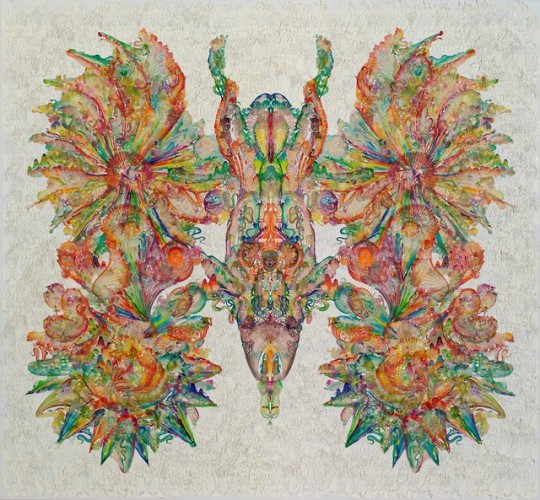
Wu Jian'an (Chinese, b. 1980) - Giant Butterfly No.3 大蝴蝶之三, Hand dyed and waxed paper-cut, cotton thread, paper 手工着色和浸蜡镂空剪纸, 棉线, 纸, 180.0 × 195.0 cm (2017)
146 notes
·
View notes
Photo
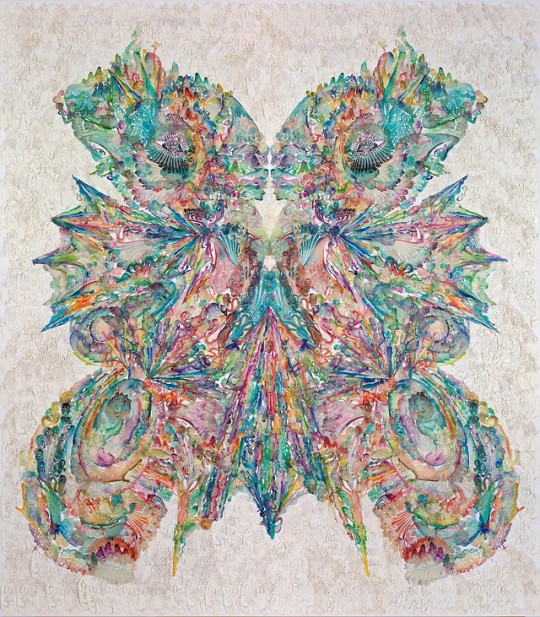
Wu Jian'an 邬建安 - Giant Butterfly No.1 (hand dyed and waxed paper-cut, cotton thread, paper, 2017)
88 notes
·
View notes
